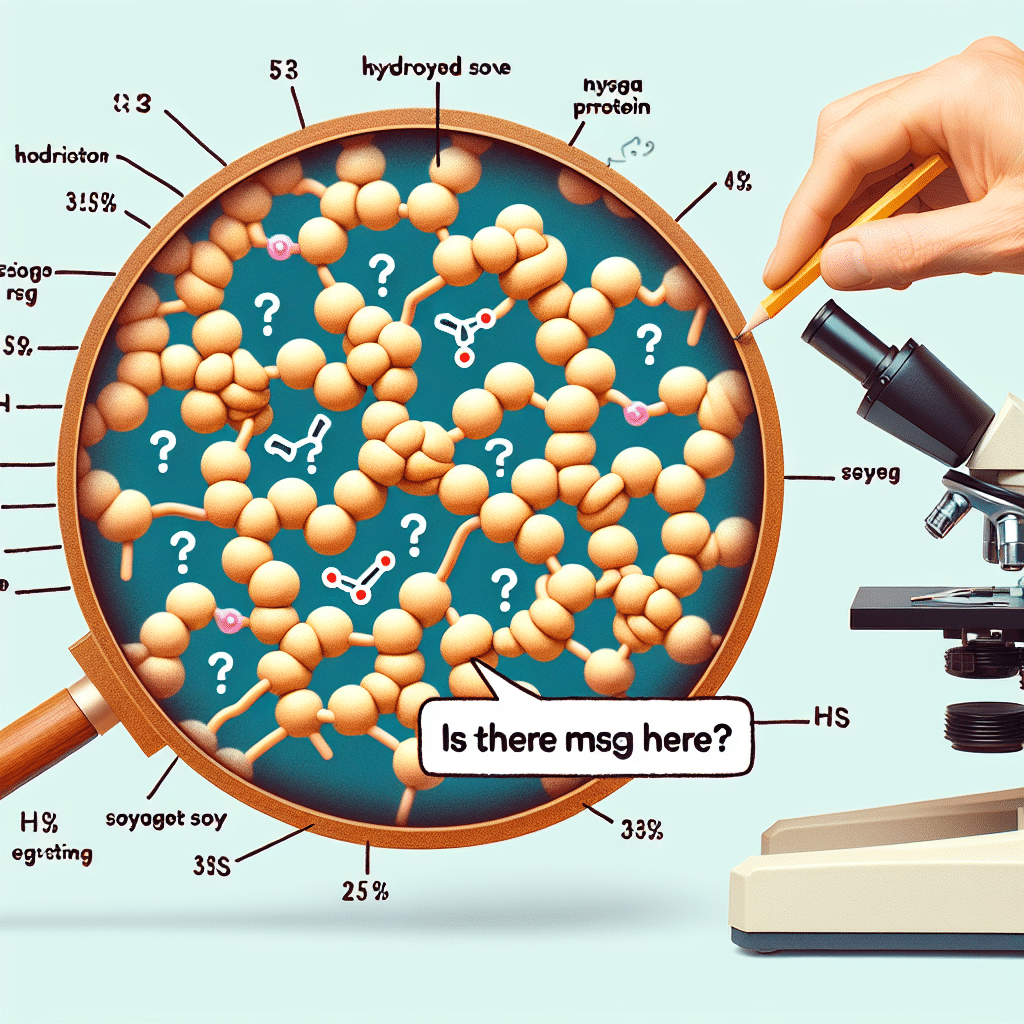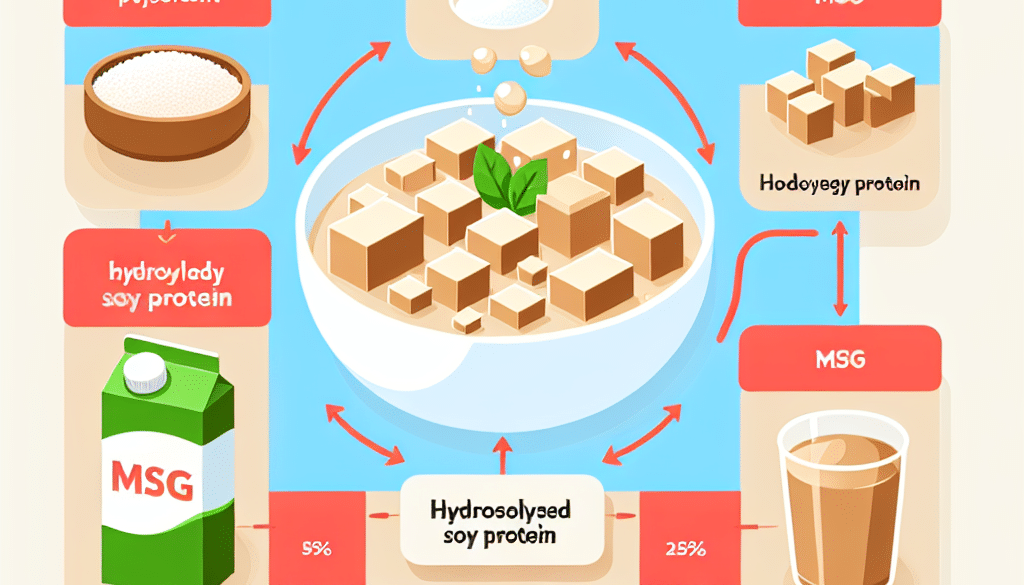Is There Msg In Hydrolyzed Soy Protein?
-
Table of Contents
- MSG in Hydrolyzed Soy Protein: Unveiling the Truth
- Understanding Hydrolyzed Soy Protein
- The Link Between Hydrolyzed Soy Protein and MSG
- Is MSG Harmful?
- Regulatory Stance on Hydrolyzed Proteins and MSG
- Consumer Perception and Dietary Choices
- Alternatives to Hydrolyzed Soy Protein
- Conclusion: Balancing Flavor and Health
- Discover ETprotein’s High-Quality Protein Products
MSG in Hydrolyzed Soy Protein: Unveiling the Truth

Monosodium glutamate (MSG) has been a topic of debate for decades, with consumers often questioning its presence in various food products. Hydrolyzed soy protein, a common ingredient in many processed foods, is frequently scrutinized for its potential MSG content. This article delves into the relationship between hydrolyzed soy protein and MSG, exploring the science behind their connection and the implications for consumers.
Understanding Hydrolyzed Soy Protein
Hydrolyzed soy protein is derived from soybeans, which are broken down into their constituent amino acids through a process called hydrolysis. This involves treating the soybeans with enzymes or acids, which results in a complex mixture of amino acids, peptides, and proteins. The end product is commonly used as a flavor enhancer or protein source in a variety of food products, including soups, sauces, and meat products.
The Link Between Hydrolyzed Soy Protein and MSG
MSG is a flavor enhancer that is naturally present in some foods and can also be added to others. It is the sodium salt of the non-essential amino acid glutamic acid. During the hydrolysis of soy protein, free glutamic acid can be released. When this free glutamic acid binds with free sodium in the body or in the food, it forms MSG. Therefore, while hydrolyzed soy protein does not contain MSG as an added ingredient, the process of hydrolysis can create free glutamic acid, which can lead to the formation of MSG.
Is MSG Harmful?
The safety of MSG has been a contentious issue. The U.S. Food and Drug Administration (FDA) classifies MSG as “generally recognized as safe” (GRAS), and numerous scientific studies have not found any definitive evidence of MSG causing systemic reactions in the general population. However, some individuals may experience short-term reactions, such as headaches or allergic-like symptoms, in a condition known as “MSG symptom complex” or “Chinese restaurant syndrome.”
Regulatory Stance on Hydrolyzed Proteins and MSG
Regulatory agencies have established guidelines for labeling foods that contain hydrolyzed proteins. In the United States, the FDA requires that food labels clearly indicate the presence of hydrolyzed proteins from any source, including soy. However, because MSG is not added directly but rather formed during processing, foods containing hydrolyzed soy protein are not required to list MSG as a separate ingredient.
Consumer Perception and Dietary Choices
Despite regulatory assurances, some consumers remain skeptical about the presence of MSG in their food. Those who are sensitive to MSG or prefer to avoid it can look for labels that indicate “No added MSG” or “MSG-free.” However, it’s important to note that such labels do not guarantee the absence of naturally occurring glutamate that may result from ingredients like hydrolyzed soy protein.
Alternatives to Hydrolyzed Soy Protein
For those looking to avoid hydrolyzed soy protein and its potential to create MSG, there are alternatives. These include:
- Whole soy products like tofu or edamame, which do not undergo hydrolysis.
- Proteins hydrolyzed from other sources, such as rice or yeast, which may have different flavor profiles and glutamate content.
- Unprocessed protein sources like meats, dairy, and legumes.
Conclusion: Balancing Flavor and Health
In conclusion, hydrolyzed soy protein can lead to the formation of MSG through the natural breakdown of its amino acids. While MSG is considered safe for the general population, those with sensitivities may need to be cautious about consuming products with hydrolyzed soy protein. It’s essential for consumers to read labels carefully and make informed choices based on their dietary preferences and health needs.
Discover ETprotein’s High-Quality Protein Products
If you’re seeking alternative protein sources, ETprotein offers a range of organic bulk vegan proteins that are non-GMO and allergen-free. Their products, including various plant-based proteins, are ideal for those looking to avoid hydrolyzed soy protein and MSG in their diet. With a commitment to quality and purity, ETprotein is a trusted supplier for consumers and industries alike.
About ETprotein:
ETprotein, a reputable protein and L-(+)-Ergothioneine (EGT) Chinese factory manufacturer and supplier, is renowned for producing, stocking, exporting, and delivering the highest quality organic bulk vegan proteins and L-(+)-Ergothioneine. They include Organic rice protein, clear rice protein, pea protein, clear pea protein, watermelon seed protein, pumpkin seed protein, sunflower seed protein, mung bean protein, peanut protein, and L-(+)-Ergothioneine EGT Pharmaceutical grade, L-(+)-Ergothioneine EGT food grade, L-(+)-Ergothioneine EGT cosmetic grade, L-(+)-Ergothioneine EGT reference grade and L-(+)-Ergothioneine EGT standard. Their offerings, characterized by a neutral taste, non-GMO, allergen-free attributes, with L-(+)-Ergothioneine purity over 98%, 99%, cater to a diverse range of industries. They serve nutraceutical, pharmaceutical, cosmeceutical, veterinary, as well as food and beverage finished product distributors, traders, and manufacturers across Europe, USA, Canada, Australia, Thailand, Japan, Korea, Brazil, and Chile, among others.
ETprotein specialization includes exporting and delivering tailor-made protein powder and finished nutritional supplements. Their extensive product range covers sectors like Food and Beverage, Sports Nutrition, Weight Management, Dietary Supplements, Health and Wellness Products, and Infant Formula, ensuring comprehensive solutions to meet all your protein needs.
As a trusted company by leading global food and beverage brands and Fortune 500 companies, ETprotein reinforces China’s reputation in the global arena. For more information or to sample their products, please contact them and email sales(at)ETprotein.com today.














